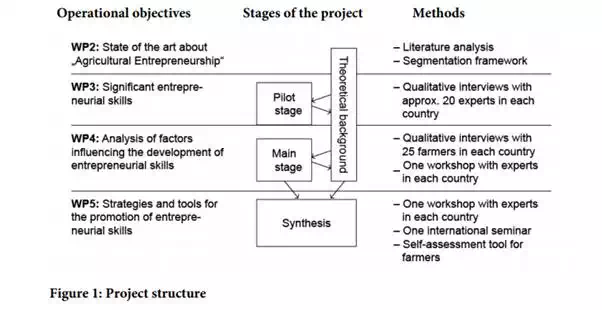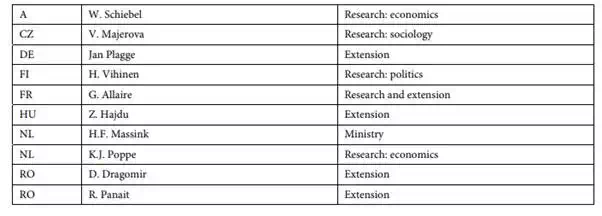Overall methodology
As an overall methodology, the project followed an approach that combined analytical top-down analysis with empirical qualitative research.
Analytical top-down analysis was present in every phase of the project, connected in feedback loops with the empirical part. The empirical part consisted of qualitative in-depth interviews and workshops with stakeholders from the agricultural socio-technical network.
Due to the qualitative focus of the project, no statistical analysis of the empirical data has been undertaken. Although statistical data from a survey concerning entrepreneurial skills are presented within the main stage of the project, these data are not part of the project at hand.
The empirical analysis was conducted in each partner country: England, Finland, Italy, the Netherlands, Poland and Switzerland. The results were commented on and augmented by the members of the advisory board who come from six additional European countries and from the Netherlands and Finland.
The following figure shows the stages of the project with their corresponding operational objectives and the methods applied.
The initial stage of the project involved reviewing the existing scientific literature on entrepreneurship and entrepreneurial skills in agriculture. It formed the basis for a) an initial overview of the relevance of the concept of entrepreneurship to agriculture and the elaboration of more specific research questions, and b) devising a segmentation framework of entrepreneurial farmers.
The pilot stage (Work package 3) continued the work of highlighting the relevance of entrepreneurship for agriculture and concluded with a list of skills a farmer needs in general today in order to succeed in his business and, more specifically, which entrepreneurial skills a farmer needs today. Three strategic orientations were identified which, we assumed, have an influence on the importance of entrepreneurial skills.

These entrepreneurial skills were analysed in the main stage of the project (Work package 4), again taking into account the three strategic orientations identified. Also in the main stage, the concept of entrepreneurial skills was elaborated in detail.
The project concluded with a synthesis stage (work package 5) in which the analytical and empirical results were linked in order to produce concrete recommendations and tools for the promotion of entrepreneurial skills.
Work package 1 is not shown in Figure 1, as it contained the project management.
Project management
Table 1 gives an overview of participating partners
Table 1: Partners and staff in the ESoF project

Each of the four work packages was organised by one of the partners. All empirical work was conducted in all partner countries. For Work package 3 and Work package 4 printed versions, which differ slightly from the reports delivered to the EC, are also available.
All public reports have been sent to the Advisory Board of ESoF for comments, including this final report.
The Advisory Board consisted of 10 people from different academic disciplines and work backgrounds. Table 2 shows a list of the Advisory Board members.
Table 2: Advisory Board of ESoF

The authors are fully aware of the role of women in agriculture and the existence of female farmers and entrepreneurs. In order to simplify the reading, though, the authors decided to use only the male formulation.